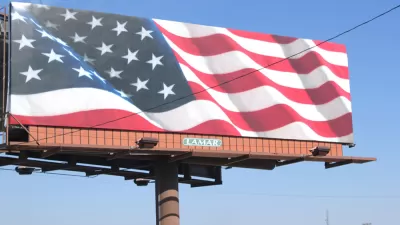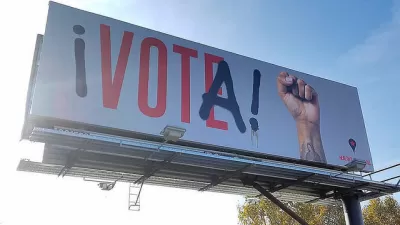Kevin Fry, president of Scenic America, explains the threat to the urban fabric posed by lax billboard policies. He also explains how cities can avoid L.A.'s problems enforcing outdoor advertising codes.
The aritcles features an interview with Scenic America President Kevin Fry:
"The city of Los Angeles has surrendered its built environment to advertising and sign companies. That's a terrible tragedy for L.A. and the whole country, because what's playing out in L.A. is happening on a smaller scale in other places."
"Los Angeles probably has the worst billboard problem in the country. No one knows exactly how many billboards there are in L.A. because the industry has prevented the city from counting them, which was the source of a series of lawsuits that were settled a couple of years ago. There is a minimum of 10,000 to 11,000 billboards in the city, of which probably a minimum of one-third are illegal."
"The billboard industry has been extremely cleaver in offering to public officials, for example, some kind of trade or revenue sharing for things like parks or public amenities in exchange for rights to put up a billboard on or near public property. By doing that you do a couple of things. One, you weaken your overall ability to control signs in other places where you purportedly don't want them. Exceptions make it very difficult to enforce a law. The industry is very clever in that they have encouraged cities to carve out exceptions to the law. When the city then tries to enforce the law in other places, they are sued based on the inconsistent enforcement of the law. The city finds itself in a trap."
Thanks to James Brasuell
FULL STORY: City of L.A.: ‘Worst’ Billboard Policy Enforcement in Nation

Trump Administration Could Effectively End Housing Voucher Program
Federal officials are eyeing major cuts to the Section 8 program that helps millions of low-income households pay rent.

Planetizen Federal Action Tracker
A weekly monitor of how Trump’s orders and actions are impacting planners and planning in America.

Ken Jennings Launches Transit Web Series
The Jeopardy champ wants you to ride public transit.

Rebuilding Smarter: How LA County Is Guiding Fire-Ravaged Communities Toward Resilience
Los Angeles County is leading a coordinated effort to help fire-impacted communities rebuild with resilience by providing recovery resources, promoting fire-wise design, and aligning reconstruction with broader sustainability and climate goals.

When Borders Blur: Regional Collaboration in Action
As regional challenges outgrow city boundaries, “When Borders Blur” explores how cross-jurisdictional collaboration can drive smarter, more resilient urban planning, sharing real-world lessons from thriving partnerships across North America.

Philadelphia Is Expanding its Network of Roundabouts
Roundabouts are widely shown to decrease traffic speed, reduce congestion, and improve efficiency.
Urban Design for Planners 1: Software Tools
This six-course series explores essential urban design concepts using open source software and equips planners with the tools they need to participate fully in the urban design process.
Planning for Universal Design
Learn the tools for implementing Universal Design in planning regulations.
Ada County Highway District
Clanton & Associates, Inc.
Jessamine County Fiscal Court
Institute for Housing and Urban Development Studies (IHS)
City of Grandview
Harvard GSD Executive Education
Toledo-Lucas County Plan Commissions
Salt Lake City
NYU Wagner Graduate School of Public Service





























